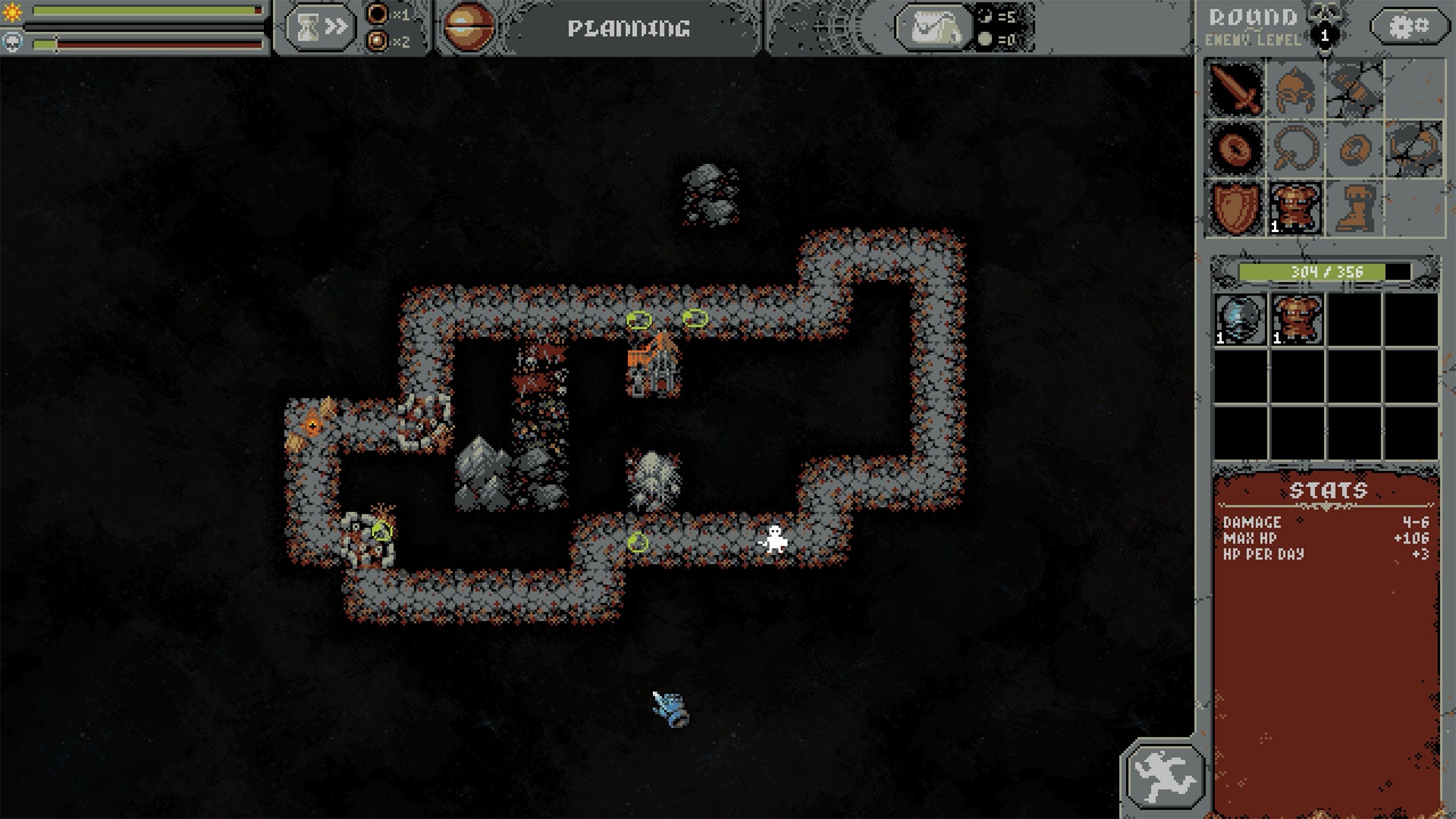Today, RPGs are more focused on the impact of narrative choice, with games like Mass Effect lauded for their spiderweb-like branching points. It’s a trend taken to its limit by Disco Elysium, which trades traditional combat for sharp exchanges and insults. Still, the classical dungeon crawler lives on through Dark Souls, Diablo, and now a curious little auto-battler called Loop Hero. Developed by a small Russian indie studio called Four Quarters, Loop Hero has rapidly become a hit, trailing only the breakout survival hit Valheim on Steam’s bestseller lists. It derives its name from the loop its hero travels as the world grows around them, monsters appearing on the path as they appear. If it were a D&D campaign, it would be what a role-playing partner of mine once referred to as a “beer and pretzels game” - minimal storytelling, lots of rolling for combat. As your character trudges along in a circle, automatically defeating slimes and spiders along the way, you earn cards containing resources and buildings. These items can be placed anywhere along the path, creating an ever-evolving series of obstacles for the tireless hero to traverse. Defeating monsters generates loot, which can be turned into simple but effective builds, which then allows the hero to defeat monsters more efficiently. It’s the traditional role-playing game loop visualized as a literal circle. After a few revolutions, the loop becomes a vibrant fantasy world filled with haunted forests, mansions, and mountains resembling nothing so much as a classic cloth map. This feeling is enhanced by its aesthetic, which seems deliberately evocative of the PC RPGs of the late 80s and early 90s, particularly Treasures Of The Savage Frontier. It’s as if an entire D&D campaign is unfolding in front of you in the span of a few minutes, filled with tense encounters with vampires and other fantasy creatures. It can be surprisingly difficult. It’s tempting at first to equip whatever items make your attack and defense go up - the loot comes in so fast that it can be hard to keep up even with the pause function. But it’s better to lean into the secondary effects, particularly evasion and vampiric attacks, as they dramatically enhance survivability as the number of enemies increases. Similarly, mob placement is a key consideration. Do you spread them out in order to ramp up more slowly, or do you clump them together to create more difficult encounters that yield greater rewards? These tense moment-to-moment decisions are a big part of why Loop Hero is so compulsive. What’s interesting is that for all its old-school pretensions, Loop Hero plays into plenty of modern trends. Its town-building element - in which resources you collect on the trail are invested in buildings that enhance your runs - are reminiscent of recent roguelikes such as Hades. Its deck-building component brings to mind Slay The Spire, which managed to find a passionate audience by mixing draft play with tense tactical boss battles. And of course there’s the way it plays into the popularity of real-time dungeon crawlers like Diablo, its constant spread of cards and loot akin to the loot pinatas that define those games. It’s more a mash-up than anything, incorporating elements of the tower defense, CCG, and rogue-lite genres, all dressed up as a tribute to the dungeon crawlers of the past. But it’s a very clever mash-up, managing to evoke all the memories of classic RPGs with a simple and very tight setup. In particular, it nicely captures why dungeon crawlers still resonate after all these years - the feeling of discovery as you build out the map, the sense of danger as you weigh the benefits and drawbacks of one more run, the satisfaction of building your hero into a juggernaut in real time. I’ll admit to having never been that focused on the play-acting aspect of role-playing. I gave my first ever D&D character amnesia in part so I wouldn’t have to think too hard about her characterisation early on. I was more interested in balancing out my character’s sheet so she could hold her own in the field. I wasn’t the only one, either. Call me a min-maxer or whatever else, but for me the storytelling tended to spring organically from the systems rather than the other way around. Loop Hero is very much in that tradition, one that has been a genre bedrock for nearly as long as video games have existed. And as a charming throwback to dungeon crawlers gone by, it’s a delight.
